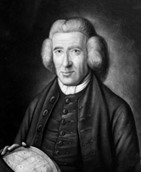One of the things that people sometimes say to us when they are debating about coming to live in north-east Scotland and work at RGU is that they don’t know much about the academic hinterland of the area. Several of our recent blogs, including the last one about the philosopher Thomas Reid, hopefully should encourage them, but just to re-emphasise the point, I’d like to give you a little more information about a self-educated Aberdeenshire man who became one of Scotland’s finest scientists and astronomers who was so was widely influential in his own time that Thomas Paine mentioned him in his publication ‘The Age of Reason’ and William Herschel studied astronomy from his books.
James Ferguson was born near Rothiemay in Banffshire on 25th April 1710. His fame is largely due to his skill as an inventor and improver of astronomical and other scientific apparatus, but, equally impressive, is the fact that he was almost entirely self-educated.
His father taught him to write and he was sent to the grammar school at Keith, Aberdeenshire, when he was seven years of age. The three months he spent there were the only formal education he ever received. When he was ten, he began to work at a neighbouring farm, tending the sheep. While there, he made models of machines and studied the stars at night (light pollution wasn’t an issue in the 18th century!). He also made a clock with wooden gears and a spring made of whalebone.
After living in Edinburgh for a short time, he moved to Inverness, where he drew his Astronomical Rotula for showing the motions of the planets, places of the sun and moon etc. Then, in 1743 went to London, where he lived for the rest of his life, becoming a fell of the Royal Society and devising astronomical and mechanical models, including globes. He also travelled throughout England, giving public lectures on experimental philosophy, where his clear explanations, ingeniously constructed diagrams and his mechanical skills made him one of the most successful of popular lecturers on scientific subjects.
His reputation was not confined to the UK and he was elected to the American Philosophical Society in 1770, while the German experimental physicist Georg Lichtenberg noted of Ferguson that: “Everything was done by experiments.” Ferguson died in London on 17 November 1776 and was buried in St Marylebone churchyard, but, while, like Thomas Reid, perhaps not so well known today, James Ferguson is without doubt one the most remarkable Scottish scientists of all time.
Julie Skinner, Resourcing and Benefits Specialist, RGU


